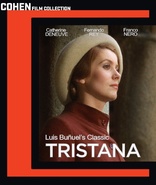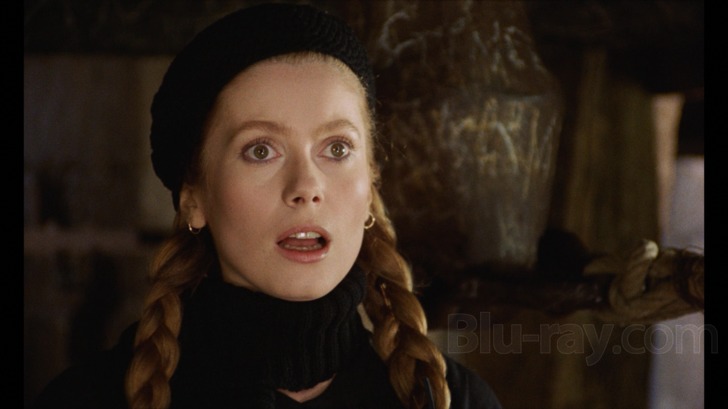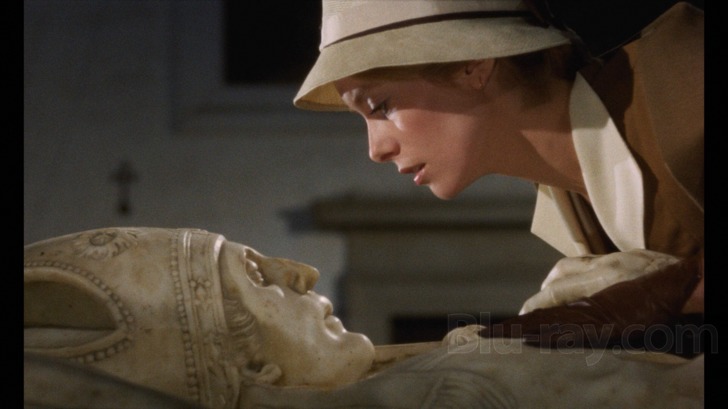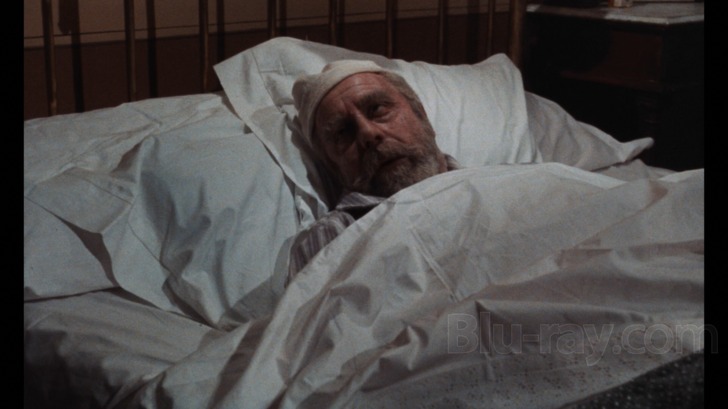Tristana Blu-ray Movie
HomeTristana Blu-ray Movie 
Cohen Media Group | 1970 | 105 min | Rated PG-13 | Mar 12, 2013
Movie rating
7.3 | / 10 |
Blu-ray rating
| Users | 4.2 | |
| Reviewer | 4.5 | |
| Overall | 4.2 |
Overview
Tristana (1970)
After the death of her mother, Tristana goes to live with her guardian, Don Lope, an older man who eventually breaks through his facade of respectability and seduces her. She repays him a hundred fold, preying on his jealousy and taunting him with perverse whimsies.
Starring: Catherine Deneuve, Fernando Rey, Franco Nero, Lola Gaos, Antonio CasasDirector: Luis Buñuel
| Foreign | Uncertain |
| Drama | Uncertain |
Specifications
Video
Video codec: MPEG-4 AVC
Video resolution: 1080p
Aspect ratio: 1.66:1
Original aspect ratio: 1.66:1
Audio
Spanish: DTS-HD Master Audio 5.1 (48kHz, 24-bit)
English: DTS-HD Master Audio 5.1
Subtitles
English
Discs
50GB Blu-ray Disc
Single disc (1 BD)
Playback
Region free
Review
Rating summary
| Movie | 4.5 | |
| Video | 4.0 | |
| Audio | 4.0 | |
| Extras | 4.0 | |
| Overall | 4.5 |
Tristana Blu-ray Movie Review
Male chauvinist Pygmalion.
Reviewed by Jeffrey Kauffman February 28, 2013In the eternal war between the sexes, has there ever been a more cogent commentator than Luis Buñuel? Buñuel might not have exactly been a referee, at least on the surface, as his films often seemed to skewer men a bit more than women, though that thesis is pretty easily debunked in any number of films, with 1970’s Tristana being one of the best examples. One of the most fascinating things about Tristana is that while it goes about detailing the evolving (some might say devolving) relationship between Tristana (Catherine Deneuve) and her guardian cum lover Don Lope (Fernando Rey), the film actually touches upon a glut of other elements, things as disparate as the ephemeral nature of consciousness “knowing” the difference between dreams and waking, the moral turpitude of the Catholic church (and this was decades before the sad headlines of the last several years) and the general buffoonery of the bourgeoisie, all typical Buñuel subjects. Tristana had a long and rather tortured history and remained a forbidden fruit of sorts for Buñuel. The filmmaker had long been exiled from his native Spain to Mexico, and as early as 1962 or so had dreamed (no pun intended) of making Tristana the vehicle for an imagined celebrated return to his native country. Based on a novel by Benito Pérez Galdòs, the same author whose source novel provided the inspiration for Buñuel’s notorious but rather similar 1961 film Viridiana, Tristana seemed indeed to be a near perfect property for Buñuel to reestablish himself in Spain. What actually happened was years of disappointment and delay, capped by a rather vicious reaction by the fascistic powers that still dominated Spain as late as 1968 and 1969, when the film was already in the throes of pre-production. The rather ironic thing about all of this is that by “regular” Buñuel standards, Tristana is a rather restrained film, one that admittedly deals in some unseemly subject matter but which does so in a relatively restrained way. Buñuel was only too aware of his reputation as an intentional provocateur, but his poking and prodding here is often intimated rather than overt, which gives Tristana actually more of a wallop, albeit perhaps after the fact, when some of the film’s more subliminal elements have been given time to percolate in the viewer’s subconscious.

There is in fact a kind of through line linking Viridiana to the previous Buñuel – Deneuve collaboration, 1967’s Belle de jour to Tristana itself. All three films depict central female characters who undergo a rather startling “maturation” (for want of a better term) of initially relatively naïve and/or innocent points of view. If Viridiana tends to focus more on a so-called peasant class, both Belle de Jour and Tristana are resolutely centered on a supposed “better” (meaning more affluent) class of people, which in Buñuel’s formulation means absolutely nothing, at least in terms of their moral (or immoral) proclivities. In fact it’s obvious that Buñuel has a somewhat softer spot in his heart for the uneducated worker class than he does for the effete snobs of the petit bourgeoisie (which is not to say he doesn’t reserve some piquant nose holding for the less privileged, as the final act of Viridiana makes abundantly clear).
Buñuel scholar Peter William Evans offers some salient comments in a fascinating supplement included on this Blu-ray, highlighting the director’s interest in Freudian psychology from his earliest filmmaking days. With that in mind, one might wonder what exactly Tristana’s relationship with her father might have been, for her relationships with some men at least, notably Don Lope, are colored by a certain ruthlessness. It’s in this aspect that Buñuel proves himself an equal opportunity critic of gender behaviors. Tristana may indeed have been abused, psychologically and physically, by Don Lope in her younger years, but she’s no fool or wilting violet herself, and she spends the rest of her life exacting her own particular brand of revenge. It's also notable how Tristana teases the mute handyman (really more of a handy boy) that comes to help around the Don Lope estate. She obviously relishes her ability to sexually torment the young man, becoming in a very real way her own version of Don Lope to the boy's innocent Tristana. (There is some cogent commentary in both of these relationships about the dynamics between the power wielder and the powerless.)
The one relationship where Tristana does not exhibit her crueler tendencies is with the artist Horacio (Franco Nero), a man who brings out a softer side of the character, at least with regard to him if not to Don Lope. Tristana almost tends to exist as a sibling to Pygmalion in a way, then, with Don Lope attempting to “educate” Tristana, though the education is more carnal than Higgins’ tutoring of Eliza. Much as with Shaw’s original formulation of Eliza’s story, Tristana discovers her own power and isn’t shy about using it. Horacio helps that blossoming to occur. There’s a peculiar, almost involuntary ménage a trois that ends up happening in Tristana that some might assume Buñuel delighted in, especially after the hints he gave about this same sort of relationship in the closing moments of Viridiana. (Though it’s only a tangential connection, there’s also a certain similarity to Nero’s 1967 co-starring role in Camelot. In both films, the Nero character intrudes on a longstanding relationship which has begun to fray around the edges.)
The film takes some decidedly unexpected turns, both structurally and with regard to its somewhat meandering plot. Don Lope is a variation on a Buñuel trope, the older man obsessed with a younger woman (much the same formulation as in That Obscure Object of Desire, again starring Fernando Rey). But Tristana is in many ways one of the most distinctive female characters in Buñuel’s oeuvre, one in her own way closer to the Deneuve character in Belle de Jour than to the would be nun in Viridiana. Interestingly, it isn’t until Tristana is truly physically wounded that she finally “officially” relents to Lope’s incessant amorous advances.
The more captivating element in Tristana is how artfully it plays with the shadow world between the waking state and dreams, as well as the passage of time. There’s one duly celebrated sequence in Tristana where we don’t realize we’re involved in a dream until after the dreamer has awoken, but that strange, eerie feeling of not knowing whether or not something is really happening suffuses this entire film. Just as interesting, though perhaps more subliminally presented, is the film’s unusual approach to time. It’s a longstanding tradition that a passage of time is often presented to the viewer with a lap dissolve, fade or wipe between scenes. Notice how often Buñuel actually offers long periods (sometimes years) of passage with a hard edit, with nothing other than a transitory line of dialogue to reorient the viewer about what the timeframe is.
Peter William Evans talks about Buñuel’s fascination with so-called amour fou, i.e., uncontrollable, overwhelming passion. Tristana plays on this theme in a number of unexpected ways. If Don Lope is the most obvious exemplar of a buffoon being led around by his (aging) hormones, there are some subtler aspects to the idea in the film as well. Tristana has her own version of this compulsion. It’s riddled with darker elements, but in her own way, she is as drawn to Lope as he is to her, though for radically different reasons.
Tristana Blu-ray Movie, Video Quality 

Tristana is presented on Blu-ray courtesy of Cohen Media Group with an AVC encoded 1080p transfer in 1.66:1. Sadly, Tristana was evidently not especially well curated over the years, and so Cohen Media Group needed to undertake a substantial restoration of this title. This restoration evidently was composited from source elements that included the negative as well as an undefined "positive" source (it's unclear whether this was a print or an interpositive). The results are largely commendable and in fact from a damage standpoint, Tristana is virtually blemish free. There are some minor registration discrepancies which may be tied back to the different source elements (and, perhaps, an inability to overcome differences in color timing), but the major issue some may have with this transfer is how dark it sometimes is, with understated contrast. It's frankly been years since I've seen Tristana theatrically, but the church scene toward the end of the film immediately struck me as being quite a bit darker than I remembered it, and in fact the brief snippet of that scene in the original French trailer included on this Blu-ray shows a much brighter ambience. Other than these probably niggling concerns, the rest of this high definition presentation is extremely laudable. Colors, while often muted (intentionally so), are accurate looking and nicely saturated. Fine detail is very good in close-ups, and the entire transfer features a very naturally filmic appearance that does not exhibit any egregious signs of digital sharpening or noise reduction.
Tristana Blu-ray Movie, Audio Quality 

Tristana features lossless DTS-HD Master Audio 5.1 tracks in both the original Spanish as well as an English dub. (The film was originally released in two different versions, Spanish and French, and it would have been fantastic to have had the French track here). As Deneuve mentions in her commentary, both she and Franco Nero were dubbed (some would say not especially well) in the Spanish version, so what might appear to be sync issues are in fact due to the fact that Deneuve was speaking French on set. The repurposed 5.1 tracks aren't especially immersive, but there are some nice foley effects which are smartly presented in the surround channels. Dialogue is resolutely anchored front and center, but fidelity is excellent. The piano cues (Tristana is a budding pianist) also sound great, and I'm happy to report that whoever fingered Chopin's notoriously difficult Revolutionary Etude is in fact really playing it, not merely "finger synching" to a prerecorded track.
Tristana Blu-ray Movie, Special Features and Extras 

- Tristana's Sentimental Education: A Conversation Between Catherine Deneuve and Kent Jones: 2012 is a rather artfully named commentary track which will be indispensable for most Buñuel and Deneuve aficionados. Deneuve is quite forthcoming about her trepidation over working with Buñuel again after the very difficult shoot of Belle du Jour. Her memory is still quite strong about this film and she provides a lot of interesting anecdotal information about the director and the actual filming. Wisely, Jones mostly stays out of the way, occasionally prodding her on with questions or auxiliary comments. Though not directly related to this film, it's fascinating to hear Deneuve's passing comments about other legendary directors with whom she's worked, like Polanski and Truffaut.
- Luis Buñuel's Tristana: Repression and Desire (1080p; 32:01. Buñuel scholar Peter William Evans provides some fascinating insight into the film, giving its historical background as well as analyzing some of its themes.
- Alternate Ending (1080p; 1:06) offers a slightly different montage of scenes from Tristana's life, as well as a different soundtrack, but is otherwise substantially similar to the final cut of the film.
- 2012 Restoration Trailer (1080p; 1:36)
- Original French Theatrical Trailer (1080i; 3:04)
Tristana Blu-ray Movie, Overall Score and Recommendation 

Tristana traffics in a number of Buñuel's favorite subjects and tropes, but it does so in an unusual and quietly provocative manner. This is a film that seems simple, almost ridiculously so, on its surface but which reveals layer upon layer of resonances upon further rumination. Like the best of Buñuel's pieces, there's an almost revelatory dreamlike quality to much of the storytelling, and, again as with most Buñuel, Tristana is a singular viewing experience. This Blu-ray offers very good video and audio and the supplementary material is first rate. Highly recommended.
Similar titles
Similar titles you might also like

The Milky Way
La voie lactée
1969

Diary of a Chambermaid
Le journal d'une femme de chambre
1964

The Phantom of Liberty
Le fantôme de la liberté
1974

Belle de jour
1967

A Woman Is a Woman
Une femme est une femme
1961

The Spirit of the Beehive
El espíritu de la colmena
1973

Cría Cuervos
1976

The Discreet Charm of the Bourgeoisie
Le charme discret de la bourgeoisie
1972

Les Dames du Bois de Boulogne
1945

The Painted Bird
Nabarvené ptáce / Slipcover in Original Pressing
2019

That Obscure Object of Desire
Cet obscur objet du désir / StudioCanal Collection
1977

...And God Created Woman
Et Dieu... créa la femme
1956

Pieta
피에타
2012

Broken Embraces
Los Abrazos Rotos
2009

Au hasard Balthazar
1966

Jules and Jim
Jules et Jim
1962

Viridiana 4K
1961

The Soft Skin
La peau douce
1964

Broker
브로커 / Beulokeo
2022

Veronika Voss
Die Sehnsucht der Veronika Voss
1982